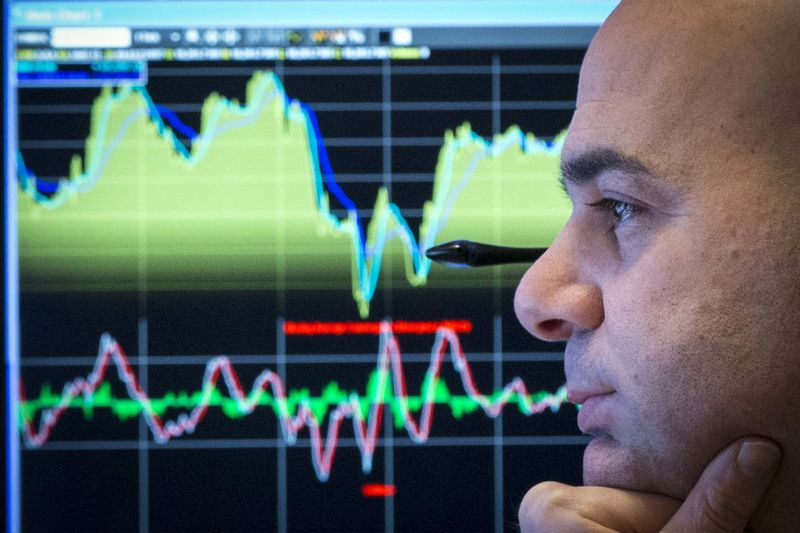Street Calls of the Week
* U.S. tariffs on EU goods hit already weak sentiment
* U.S.-EU trade https://tmsnrt.rs/2pnDS9d
* Yields in U.S. Treasuries, German bunds slip
* Oil struggles amid worries on oversupply
By Karin Strohecker
LONDON, Oct 3 (Reuters) - World stocks hovered near
four-week lows on Thursday and yields on major benchmark bonds
slipped after Washington moved to impose new tariffs on European
goods, fuelling fears about global growth and dousing risk
appetite.
MSCI's index of world stocks .MIWD00000PUS slipped 0.2%.
The euro zone benchmark index .STOXXE eked out small gains
after suffering their worst day since the early August selloff
on Wednesday, when the U.S. got the go-ahead to impose tariffs
on $7.5 billion of European goods. Washington will enact 10% tariffs on Airbus AIR.PA planes
and 25% duties on French wine, Scotch and Irish whiskies and
cheese from across the continent as punishment for illegal EU
subsidies to Airbus.
But a reduction in the initial list propped up some sectors.
Food and beverage stocks and industrial goods enjoyed healthy
gains. France's CAC index .FCHI rose 0.3%. German markets -- a
weather vane for exports -- were closed for a national holiday.
Meanwhile, fresh data showed UK services activity
unexpectedly contracted, suggesting country was flirting with
recession. The FTSE 100 .FTSE , already in the grip of Brexit
uncertainties, extend losses to 0.8%. The latest U.S.-European trade tensions added to fears over
the standoff between Washington and Beijing, which has cast a
shadow over global growth prospects. Earlier in the week,
disappointing data on U.S. manufacturing and the jobs market
suggested the trade war with China had damaged the world's
largest economy.
"The big question for a lot of folks is whether this is the
third slowdown since the financial crisis or are we now heading
for a global recession," said Anujeet Sareen, a fixed income
portfolio manager and global macro strategist for Brandywine
Global, adding his base case scenario was for a slowdown.
"The wild card in the pack is always Donald Trump and
whatever he tweets next."
Asian shares had racked up losses earlier in the day.
Japan's Nikkei stock index .N225 closed down 2%, its biggest
one-day decline since Aug. 26.
U.S. stock futures ESc1 NQc1 indicated a flat opening
after shares fell the most in nearly six weeks on Wednesday. All
three major New York share indexes lost more than 1.5%.
"Risk aversion is broadly on the rise and that has been
triggered by the weakness in U.S. manufacturing ISM data earlier
this week," said Manuel Oliveri, an FX strategist at Credit
Agricole in London.
"The outperformance of the U.S. economy compared to other
major economies has held the dollar and other risky assets up
but that has changed this week."
The flight to safety saw yields on two-year U.S. Treasury
yields US2YT=RR slip to 1.4560%, nearing a two-year low of
1.4280%. Adding to pressure on yields was a weak U.S. jobs
report, boosting expectations the Federal Reserve will cut
interest rates this month.
Traders see a 74% chance the Fed will cut rates by 25 basis
points to 1.75%-2.00% in October, up from 39.6% on Monday,
according to CME Group's FedWatch tool. FEDWATCH
Bets on a rate cut could rise further if a U.S. non-farm
payrolls report on Friday shows weakness in the labour market.
Government bond yields in safe-haven Germany DE10YT=RR
fell for the first time in over a week. In currency markets, the dollar rebounded from against the
Japanese yen JPY=EBS to trade at 107.12 yen. It at $1.0955 per
euro EUR= . The dollar index .DXY traded unchanged.
Sterling GBP= was unfazed at $1.2306 despite a surprise
contraction as investors waited for a European Union response to
Britain's latest Brexit offer.
So far, the last-ditch Brexit proposal offered by Prime
Minister Boris Johnson on Wednesday has received a cool
reception. One senior EU official said it "can't fly" because it
was an unworkable move backwards that left Britain and the EU
far apart. Brent crude LCOc1 prices slipped 0.3% to $57.44 per
barrel. Energy traders are worried about a slowing global
economy, an over-supplied market and geopolitical friction in
the Middle East. O/R
European vs US earnings https://tmsnrt.rs/2nwHxBa
Global oil demand 2019 vs. oil prices https://tmsnrt.rs/2orh33R
^^^^^^^^^^^^^^^^^^^^^^^^^^^^^^^^^^^^^^^^^^^^^^^^^^^^^^^^^^^>
